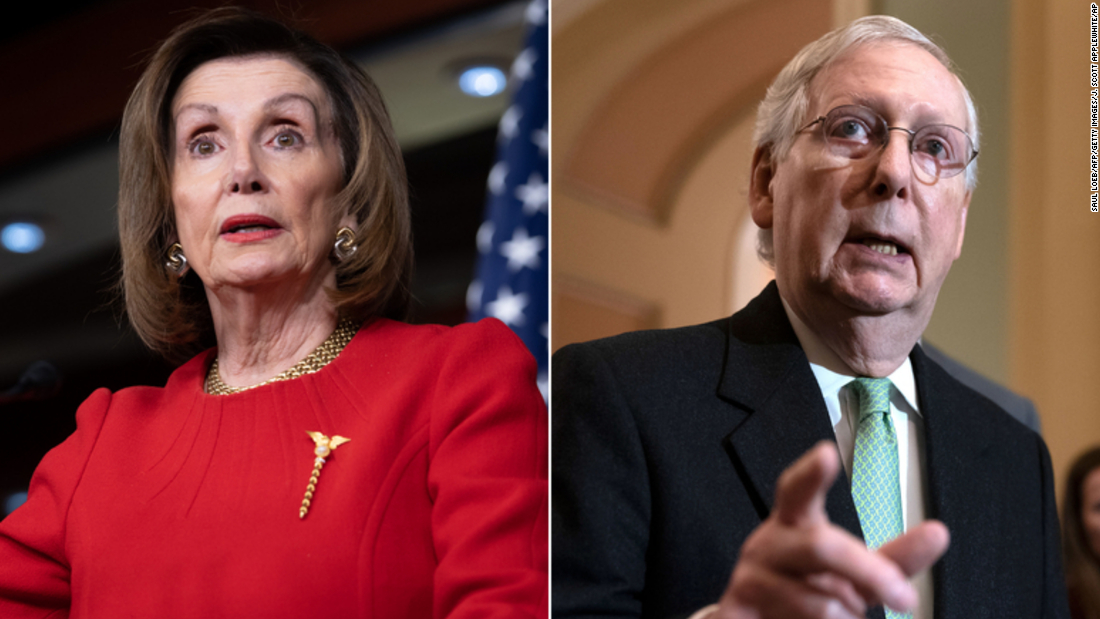Congressional leaders are finally nearing a deal on a $900 billion Covid relief package. Here’s how it could play out.
The deal is expected to include a new round of stimulus checks, but no money for state and local aid, a priority Democrats had pushed for, and no lawsuit protections, which Republicans wanted, according to a source briefed on the talks. The source cautioned that nothing is final until it is unveiled, but that’s where this is headed at the moment. A separate person familiar with the talks told CNN negotiators are closing in on a deal that will include enhanced unemployment insurance benefits.
Senate Majority Leader Mitch McConnell said in a floor speech Wednesday morning that Hill leaders have “made major headway toward hammering out a targeted pandemic relief package that would be able to pass both chambers with bipartisan majorities,” and said, “we agreed we will not leave town until we’ve made law.”
McConnell did not announce any specifics on what will be in the deal, but did offer a preview of what’s likely to be included, saying, “We need vaccine distribution money, we need to re-up the Paycheck Protection Program to save jobs, we need to continue to provide for laid off Americans.”
Senate Majority Whip John Thune told reporters that he thinks $600-$700 is under discussion for stimulus checks and “double that for family and kids.”
Thune, a Republican from South Dakota, also added he thinks there will be $300 for unemployment benefits per week.
“I feel more optimistic I think that there’s been a lot of progress made,” he said, adding, “I’m hopeful that we’ll be able to hit the deadline.”
The price tag for a stimulus deal could be close to $900 billion, a source familiar tells CNN, though more details could be out later Wednesday morning.
It won’t be an easy task. But top Democrats and Republicans expressed confidence Tuesday evening after the big four leaders met for the first time in months, emerging to say that a deal is finally in sight. But they refused to share any details.
McConnell told reporters late Tuesday night that there had been “significant progress” and he’s “optimistic,” while his Democratic counterpart, Sen. Chuck Schumer of New York, told CNN “it’s getting closer” when asked about prospects for a deal.
Once it is finalized, leadership from both parties will have to brief the rank-and-file to sell them on the agreement and then move as quickly as possible to hold a vote in both chambers. And already, there are signs of some problems in the ranks — including the House’s progressive caucus that is threatening to vote against the bill if it doesn’t include stimulus checks.
Negotiators are up against the clock ahead of a Friday at midnight deadline when government funding expires, and barring any major last-minute snags, lawmakers could be on track for a vote in the House on Thursday followed by a vote in the Senate on Friday. They would need unanimous consent from all 100 senators to schedule a vote, meaning if any senator objects, there could be at least a temporary government shutdown over the weekend.
How the legislative process could play out
Once a vote takes place in the House, there will be little time left on the calendar before a potential shutdown is triggered.
With such a narrow margin for error, get ready for rank-and-file members to attempt to exert influence on the process in an effort to win concessions. Ultimately, leadership may shut down such efforts, but that won’t stop lawmakers from trying.
Take, for example, a tweet from prominent progressive Democratic Rep. Alexandria Ocasio-Cortez of New York on Tuesday evening, calling for stimulus checks,. Other progressives are echoing that sentiment — as are Sens. Bernie Sanders and GOP Sen. Josh Hawley.
If a quick Senate vote is blocked, there could be a brief government shutdown over the weekend. And if lawmakers fail to imminently finalize a massive government spending bill for a new fiscal year, there is also a chance they could be forced to revert to a short-term funding patch instead, though lawmakers in both parties have made clear they don’t want that to happen.
What’s likely to be in the deal?
A $748 billion bipartisan proposal released this week could serve as a ready-made starting point for what might be included. That package proposes:
- $300 billion for the Small Business Administration and money for more Paycheck Protection Program loans
- $35 billion for health care providers
- $2.6 billion for the Centers for Disease Control and Prevention for vaccine distribution and infrastructure
- $3.4 billion for grants to states and cities to help with vaccine efforts
- $7 billion for grants to states for coronavirus testing and contact tracing
- $82 billion for schools and other education providers
- $25 billion for rental assistance and an increase for food stamps
- Extends the eviction moratorium until the end of January 2021
- Extends student loan forbearance through April 2021
- An expansion of federal supplemental unemployment insurance benefits by $300 per week for 16 weeks.
This story has been updated with additional developments Wednesday.
CNN’s Daniella Diaz and Ted Barrett contributed to this report.
![]()


